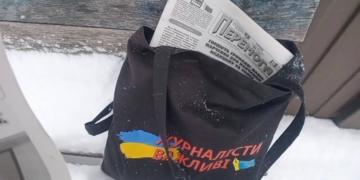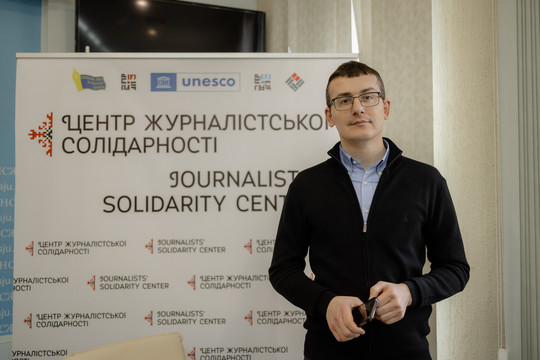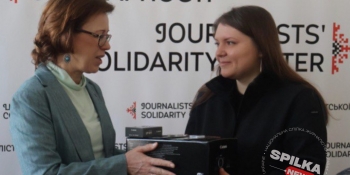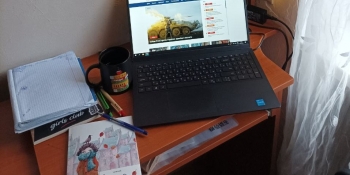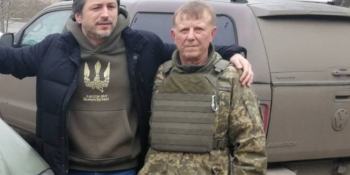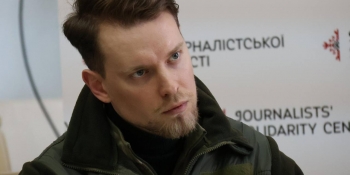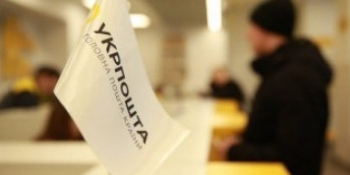Ahead of the one-year anniversary of the Russian invasion of Ukraine on 24 February, Sergiy Tomilenko, president of the National Union of Journalists of Ukraine (NUJU) looks back on a year of relentless work, in which NUJU has supported journalists on the ground and assesses the challenges they face as the war enters its second year. He highlights the crucial role of the IFJ and EFJ-backed Journalists’ Solidarity Centers in ensuring that local and international media can report on the conflict, and the imperative need for more funds to continue supporting Ukrainian journalists.
1. What are the most urgent needs of Ukrainian journalists a year after the Russian invasion of Ukraine?
First of all, I sincerely thank the IFJ/EFJ for their constant interest in the problems facing Ukrainian journalists and the media, as well as for the tireless support that the international and European journalistic community provides us with.
Thanks to the efforts of Ukrainian and international media workers, the world learned that Russia, as an aggressor country, tried to question the cultural, spiritual, and even physical survival of the Ukrainian people. One of their blows has been inflicted on the media industry of Ukraine by the invaders. According to the NUJU, during the 11 months of the war, Russian soldiers killed at least 47 Ukrainian and foreign media workers (the fate of several more remains unclear). At least eight of them were killed while performing their professional duties. [According to the IFJ Killed List, 12 journalists were killed in the line of duty in Ukraine, becoming the deadliest country for journalists in 2022.]
Cars marked as ‘Press’ are fired at regularly which proves that it is being done deliberately. In the occupied territories, journalists, and in some cases their relatives, are illegally arrested and tortured, and forced either to turn into Russian propagandists or stop their professional activities. This horror continues even now, right now, as you are reading these words. As a result of robberies and enemy shelling, the property of newsrooms is being destroyed, many journalists have become internally displaced persons and refugees, earning a living through other types of activities.
The consequences of Russia’s missile attacks on Ukraine’s energy infrastructure facilities are significant. In some regions, such as on the front-lines, as well as in Kyiv, Odessa, and Vinnytsia, power outages have a critical impact on the work of the media. However, the situation is not much better in other regions of Ukraine. As a result, readers receive information with delay.
The situation is complicated by the fact that the technical support of Ukrainian media, especially local ones, is outdated. In blackouts, the batteries of outdated equipment (laptops, cameras, voice recorders, etc.) quickly die.
Most media companies cannot afford the purchase and maintenance of a power generator. Editors complain that their employees have to work at night (when the electricity supply is resumed), drive around the city looking for areas with electricity, and work in government-organised “invincibility centers”.
In such a situation, one of the optimal options is the organisation of workplaces on the basis of Journalists’ Solidarity Centers (JSC), established by the International Federation of Journalists (IFJ) thanks to its partnership with UNESCO, and managed by NUJU. Every journalist, blogger, or freelancer can visit our centers and get access to electricity and communication for free. Such assistance to local media is very tangible and valuable.
At the same time, the limited capabilities of the JSC network (they operate only in six Ukrainian cities) has highlighted the need to purchase generators for large media located in different cities to provide colleagues from other newsrooms the opportunity to work in their premises. Russia’s large-scale war against Ukraine has significantly destroyed the economy of our country. The government estimates a drop in Ukraine’s GDP by the end of 2022 at the level of 30.4%. The media market is completely destroyed. According to our estimates, about a third of the media have stopped or suspended their output, and this process, unfortunately, goes on. As a result, many journalists are forced to leave their professional activities. Even those publications that are located in relatively safe regions have faced a critical decline in revenues. Media located in conflict zones face even more problems. Their offices have been damaged and looted and their restoration requires them to start again from scratch.
As of now, the greatest needs of the Ukrainian media are to provide their employees with generators, and power banks, as well as computers and other professional equipment in their editorial offices and to receive financial support for journalists, primarily local media, with the aim of keeping them in the profession and providing them with jobs.
2. How does the NUJU cope with the situation on the ground?
From the first day of the Russian occupation, NUJU went into a special mode of work. A ‘hotline’ for journalists from the occupied and front-line territories of Ukraine was launched. A special group was set up to monitor the situation and coordinate the actions of NUJU members. This helped us provide maximum assistance to the journalists who were fleeing dangerous regions – both with advisory and material help and to aid them to settle in a new place. It involved emergency financial support, assistance in finding apartments, providing a place to work, as well as computer equipment and necessary materials. For the first time in Ukraine, the Union launched a 24-hour ‘hotline’ for psychological help for journalists and their family members.
For those journalists who stayed in occupied territories for a certain time, a series of training sessions were organised on working in dangerous conditions, behaving in captivity, communicating with the occupiers, passing through enemy checkpoints, etc. Colleagues who have already gone through these tests and left for other regions of Ukraine shared their experiences. Material support was also provided to some of the journalists who remained in the occupied territory.
Subsequent events showed, however, that it is impossible to maintain an independent press in the occupied territory: invaders established such a harsh repressive regime that journalists were faced with a choice either to stop their professional activities, to accept propaganda work for the Russians, or to leave for the part of Ukraine still controlled by the legitimate government. NUJU conducted a solidarity campaign with Ukrainian journalists in the occupied territories. About 10 people were released. NUJU is also conducting an awareness campaign in solidarity with 15 journalists and citizen journalists being illegally persecuted in the temporarily occupied Crimea.
One of today’s main focuses is the commemoration of journalists killed and collecting information about crimes against media workers committed by the occupiers in the territory of Ukraine. In particular, a project was implemented to create more than a hundred video stories of journalists who became victims or eyewitnesses of Russian war crimes.
NUJU has been actively supported by international partners throughout the entire period since the beginning of the war. We are very grateful to the International and European Federations of Journalists and other foreign partners for their emergency support to our activity.
Since the beginning of the war, journalists’ demands to NUJU have evolved from requests for evacuation to requests for resumption of their professional activities. And this is a very positive signal. We see that dozens of journalists want to resume their activities, relink with their audience. Of course, this requires certain costs. Experts of the Journalists’ Solidarity Centers and our Union collect requests from journalists, process them and, if possible, look for donors to provide financial support.
3. Could you explain the role of the Journalists’ Solidarity Centers and what benefit they have brought to Ukrainian journalists and mass media?
The first centers were established in the western regions of Ukraine in April 2022. These regions had received a lot of journalists who had to flee their cities. At that time, the JSCs began working in Lviv, Ivano-Frankivsk, and Chernivtsi. In the summer, with the support of IFJ and EFJ and in partnership with UNESCO, the network was expanded: new centers were established in Kyiv and in large cities bordering the occupied territories, in particular, Zaporizhzhia and Dnipro.
However, the activity of the JSC network is not limited to the aforementioned six cities. Any Ukrainian journalist can apply for help in person, by phone, or online (by filling out a form). The JSCs provide organisational, technical, material, psychological, and legal assistance to journalists affected by the war to one degree or another, and also assist local and international media staff in covering the conflict.
Since the launch of the first centers in April 2022, the network has been attracting donors and providing video cameras, cameras, laptops, and other professional equipment to colleagues in need. In recent months, when Russia has been purposefully destroying Ukraine’s energy system, editorial offices faced a new challenge: the need to adapt to working in conditions of power outages. With the assistance of foreign partners, NUJU provided dozens of Ukrainian journalists with power banks and electric generators.
In addition, a one time emergency financial assistance was provided through the network of JSCs. Only recently, 160 Ukrainian media workers from different regions of the country received a one time grant of USD 600, provided by UNESCO in partnership with the IFJ
Besides, Ukrainian and international journalists who need protective equipment are provided with bulletproof vests, helmets, and tactical first-aid kits branded with the inscription ‘Press’.
Together with international partners, the JSCs help small local newsrooms to ‘stay afloat’ by providing temporary financial support to pay for staff or purchase new equipment.
The centers advise colleagues on leaving occupied territories, organise temporary relocation abroad, and conduct training sessions and other educational activities to help journalists in their work.
All six Centers are also used as co-working spaces, where one can work both using one’s own equipment or the equipment available on site.
As of the beginning of February 2023, various forms of assistance have been provided to more than 2,000 journalists. Over 200 media editorial offices, of which 90% are local, have received tangible financial and technical assistance through the JSC network. Seventy percent of the journalists who contacted the Centers are women.
The support of journalists and the media does not have a corporate purpose only. It is needed so that our colleagues have the opportunity to exert extra effort for citizens to have access to the reliable latest information.
4. Could you mention a few training sessions organised at the JSCs which are useful for Ukrainian journalists? Which journalists attend these sessions?
Conducting online and offline training sessions on current issues facing journalists in Ukraine is one of the priorities of the JSCs. For almost a year, the Centers have conducted dozens of trainings on security (survival under occupation, leaving occupied areas, working in front-line conditions, handling of dangerous objects, use of tactical first-aid kits, radiation and chemical safety, etc.), legal (work of the media in war, labor rights of journalists, changes in legislation, etc.), psychological (crisis situations, treatment in captivity, etc.), professional (expert journalism, defense against war crimes, interviews with prisoners of war, coverage of sexual violence, mojo-journalism, etc.) and other issues.
We see an interest in our events from journalists, media workers, bloggers, and freelancers.
Online training on radiation and chemical safety, which took place on October 7, was in great demand, due to the periodic shelling of energy infrastructure facilities and the occupation of the Zaporizhzhya nuclear power plant.
5. What challenges are Ukrainian journalists facing today?
Most of the new challenges are caused by the Russian military’s constant and brutal attacks against the civilian infrastructure of Ukraine.
Therefore, the major challenges for Ukrainian journalists a year after the Russian invasion remain security, physical and energy insecurity.
Thanks to the support of international financial donors, non-governmental organisations, and individual partners, it has been possible to provide journalists working in Ukraine in dangerous conditions with bulletproof vests and other means of personal protection, as well as tactical first-aid kits. Together with Reporters Without Borders, with the support of UNESCO, we prepared a Ukrainian-language adaptation of the special edition Safety Guide for Journalists.
A certain number of journalists who left the occupied and front-line territories have found new jobs or continued publishing their media in a remote format.
Maintaining safe working conditions for journalists should be continued for as long as possible. The practice has shown that organising activities of local media from the front-line zones in the conditions of the regions of Ukraine further from the front line has become a promising avenue.
Our initiative to restore the distribution of the local press in the de-occupied and front-line territories (currently, with our assistance, the activities of 20 local newspapers have been resumed) received a lot of positive feedback. It provides an opportunity to respond to several challenges at once: work for journalists, information for local residents (including evacuation options, social issues concerns, tackling everyday problems, etc.).
In a situation of information hunger in the front-line territory (in some places there is neither access to the Internet nor electricity supply), the appearance of a familiar local newspaper not only makes it possible to partially satisfy the need for information, including vital information, but also performs a psychological and stabilising function: the newspaper is seen as an element of the normal pre-war life, which people currently miss very much.
Further work on the restoration of the local press in the de-occupied and near-front territories can have a positive effect on the preservation of the journalist labour teams in the profession.
Finally, the preservation of local media is essential to support Ukrainian democracy during and after the end of the war. It is generally recognized that quality journalism is an important prerequisite for preserving freedom of speech, and therefore for a democratic system.
One of the main goals for the NUJU in 2023 will be the development of international partnerships with the aim of helping Ukrainian journalists and the media and resisting enemy propaganda, commemorating the memory of fallen journalists and supporting their families, further developing the network of the NUJU Journalists’ Solidarity Centers, and supporting local media in the territories of the de-occupied and front-line area.
6. How can unions help Ukrainian journalists?
NUJU is very grateful to those unions that came to support journalists from the first days of the war. Particularly, I would like to gratefully mention the Greek, Lithuanian, Polish, Finnish, Swedish, and Norwegian unions. Thank you all for your support and solidarity.
Unions can provide both full and partial assistance to journalists affected by the Russian aggression in Ukraine: financial support, organise the treatment of the wounded, provide financial and technical support to displaced journalists, especially in the territories close to the front-line zone. This can be done either directly or through the NUJU.
Supporting the Ukrainian journalistic community in its opposition to Russian propaganda can be a separate direction against those Russian ‘journalists’ who took and continue to take part in inciting xenophobia against Ukrainians, imposing aggressive, completely false anti-Ukrainian narratives on the Russian audience. In addition, the Union of Journalists of Russia supported the aggression by creating ‘branches’ in the occupied territories. NUJU insists on the exclusion of the Union of Journalists of Russia from the International Federation of Journalists and an international boycott against propagandists from the aggressor country. We call on the journalist communities of different countries to support us in this.
An important area of support for Ukrainian colleagues can consist in the monitoring of the state of preservation and development of freedom of speech and other democratic freedoms in Ukraine. NUJU made a well-founded criticism of the law of Ukraine On Media, which gives new rights to the national media regulator. Now that the law has been approved, the means by which its implementation will take place are important.
We are open to any help. Even the smallest contribution will enter the general pool of good deeds and, without a doubt, bring closer the victory of freedom, democracy, and the right of the Ukrainians to live in their country according to the rules inherent in the free world.
7. What message would you like to convey to IFJ member organisations today?
Nowadays, when Ukraine has been resisting the brutal, unprovoked aggression of a powerful neighbouring state for almost a year, our colleagues deserve great respect – both Ukrainian and foreign journalists, who in the harsh conditions of war, despite the physical danger, psychological stress, economic problems, continue to honestly fulfil their journalistic duty.
Today, the demand for information is huge, and it can be said that the journalist’s word is now worth its weight in gold. The priority of NUJU is to unite the efforts of media workers in creating favourable conditions for the information disseminated by the Ukrainian mass media to be of high quality and prompt. We sincerely thank our friends and partners around the world who prove in every possible way that journalists are united in their service to freedom of speech and the public’s right to know.
The war very clearly demonstrated the correctness of our slogan of recent years: ‘Journalists are important!’
Besides, I would like to express my personal thanks to Jeremy Dear, IFJ Deputy General Secretary and Ricardo Gutiérrez, EFJ General Secretary for their quick response and constant support of our initiatives. The NUJU extremely appreciates the constant support of the IFJ and EFJ and is grateful for the powerful coordination of international solidarity with Ukrainian journalists.
Glory to Ukraine!
To support IFJ/EFJ work in Ukraine, donate to Safety Fund.





